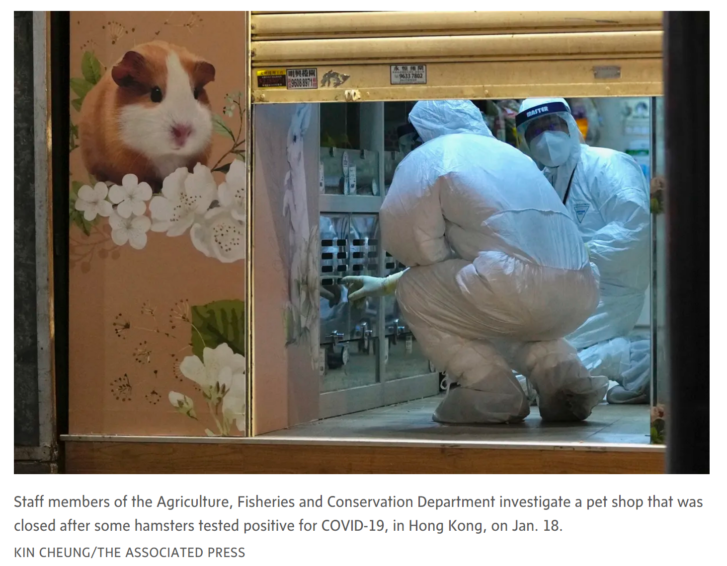Authorities in Hong Kong will euthanize some 2,000 hamsters and other small animals after a minor COVID-19 outbreak was linked to a pet shop in the city.
Speaking at a news conference Tuesday, Secretary for Food and Health Sophia Chan said preliminary testing had returned positive results for a number of animals at the Little Boss pet shop in Causeway Bay, after a 23-year-old employee tested positive for the Delta variant Sunday.
It was the first untraceable Delta infection in three months, sparking concern the employee may have been infected by the animals she was handling. A handful of other cases have since been linked to the pet shop, and those people and their close contacts have been quarantined as per Hong Kong’s strict COVID-19 regulations.

Edwin Tsui of the Centre for Health Protection said the government was not ruling out animal-to-human transmission, though no such cases have been confirmed globally to this date. SARS-CoV-2, the coronavirus that causes COVID-19, is believed to have originated in bats and may have spread to humans via a third species.
Of the 178 hamsters, rabbits and chinchillas at Little Boss that have been tested, 11 hamsters tested preliminary positive, said Leung Siu-fai, the director of the Agriculture, Fisheries and Conservation Department (AFCD). Results from a further 511 samples from a warehouse linked to the pet shop are still pending.
Mr. Leung said all animals connected to Little Boss will be killed “humanely,” as will hamsters from other pet shops in the city – some 2,000 animals in all. Anyone who has bought a hamster since Dec. 22 is “strongly advised” to turn over their pet for “humane treatment,” he added, while imports of the animals will be halted.
“We urge all pet owners to observe strict hygiene when handling their pets and cages,” Mr. Leung said. “Do not kiss or abandon them on the streets.”
Thomas Sit, the deputy AFCD head, said there was no research showing hamsters could transmit COVID-19 to humans, but the decision had been made to euthanize them nonetheless. “We don’t want to cull all the animals, but we need to protect public health and animal health. We have no choice, we have to make a firm decision,” he said.
A spokeswoman for Hong Kong’s Society for the Prevention of Cruelty to Animals (SPCA) said the organization was “shocked and concerned over the recent announcement,” which “did not take animal welfare” into consideration.
“The SPCA hope AFCD won’t take any drastic action before reviewing its approach,” she said.
The suggestion that hamsters may be responsible for spreading coronavirus in Hong Kong comes after authorities in China blamed an outbreak of Omicron in Beijing on mail from Canada, an assertion dismissed as “comical” by Conservative Leader Erin O’Toole. Chinese health officials have previously blamed frozen goods from overseas for bringing the virus into the country, even though most researchers do not believe it can be transmitted in this fashion.
Speaking earlier Tuesday, Hong Kong Chief Executive Carrie Lam said the government was “very worried” about the pet shop cluster.
In response to fears of a new pandemic wave driven by the more transmissible Omicron variant, Hong Kong recently ramped up restrictions – closing bars and gyms and banning indoor dining at restaurants after 6 p.m. The city has pursued a strict zero-COVID approach since early 2020, keeping case counts low but requiring Hong Kong – previously one of Asia’s main business and transport hubs – to be largely cut off from the rest of the world. Since Omicron began spreading around the world, flights from destinations such as Canada, the U.S. and the U.K. have been banned.
With one of the lowest vaccination rates among developed economies, and the need to keep in lockstep with China’s own zero-COVID protocols, Hong Kong officials have stuck to their hard line approach, even as businesses have warned they may abandon the city if quarantine restrictions remain in force while the rest of Asia continues to open up.
Tough quarantine regulations have also caused chaos at Penny’s Bay, the government-run camp where close contacts of COVID-19 cases are sent. A recent influx has seen camp staff struggle to process paperwork in time, with people being held for a day or more after they were supposed to be released.
Last week, the quarantine period was cut from 21 days to 14, something medical experts have long advised. Two of those who benefited were Secretary for Home Affairs Caspar Tsui and Director of Immigration Au Ka-wang, who had been quarantined after a guest at a birthday party they attended tested positive for Omicron. The pair were released Monday.
The party – which saw 200 guests celebrate with Witman Hung, a delegate to the National People’s Congress – caused widespread outrage in Hong Kong. There were calls – even from figures linked to Beijing – for the government officials involved to resign or be fired, especially after it was revealed that some may have breached tracing protocols. So far, none have left their posts.
Some of those involved tried to shift the blame onto Cathay Pacific, Hong Kong’s flag carrier, after two of its flight attendants were held responsible for spreading Omicron to the city. Both men, who have been fired by the airline after breaching home isolation rules upon their return from the U.S., were arrested Monday and charged with violating pandemic regulations, police said. If convicted, they could face as much as six months in prison.
Article From: Globe and Mail
Author: JAMES GRIFFITHS

